Ukrainian businesses report unfounded repressions during Russia’s war on Ukraine
August 2024
In July 2024, owners and top managers of Ukrainian enterprises gathered again at a roundtable in Kyiv to declare that not a single high-profile case of corruption pressure on business, monitored by the public movement “Manifesto 42,” has been transferred to court with an indictment.
Officials continue to use criminal proceedings to extort bribes and property
“Manifesto 42” is a non-governmental public movement of Ukrainian businessmen created in June 2023 to protect their enterprises against the arbitrariness of officials, judges, and special services. The name refers to Article 42 of the Constitution of Ukraine about the right to entrepreneurial activity.
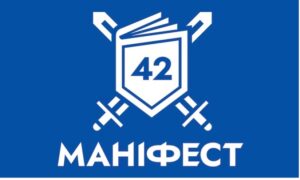
Manifesto 42
The consolidated protest of prominent representatives of Ukrainian business emerged in the spring of 2023 in response to the actions of certain government representatives.
In November 2022, several large enterprises were forcibly taken from their owners, including shareholders without dominant influence (minority shareholders).
The most significant and valuable companies among them are “Ukrnafta” and “Ukrtatnafta.” However, smaller companies and medium-sized businesses are also under pressure.
Ukrnafta is the main oil and gas producing company in Ukraine, producing 86% of oil, 28% of gas condensate and 16% of gas (from fossil hydrocarbons).
At the same time, the manufacturer of rubber products and tactical first aid kits for the army, Kievguma, which cannot be considered a leader in terms of business size, also encountered problems with law enforcement agencies.
The Security Service of Ukraine (SSU) conducted a series of searches in the company’s offices, arrested management leaders and publicly accused the company of supplying first aid kits to the enemy – Russia.
This is a typical charge when attempting to take over a business, as it appeals to public opinion. The general director of Kievguma, Andrii Ostrogrud, who joined the Manifesto 42 movement, answered that competitors offered him to divide the market in order to avoid healthy competition and when he refused, with the help of law enforcement officers, they began to destroy the reputation of his company.
In 2022-2023, Dmytro Firtash, a gas business owner residing in Austria since 2014, whose extradition Washington has been seeking for many years, was deprived of his assets in Ukraine.
His gas distribution companies were nationalised: corporate rights were confiscated at the request of the State Bureau of Investigation (SBI), and the enterprises themselves were transferred to the management of the state Asset Recovery and Management Agency (ARMA).
The High Anti-Corruption Court of Ukraine (HACC), considered the most impartial institution and recently created to handle corruption cases, lifted the arrest on the company’s shares.
However, Firtash did not regain his property. His assets were transferred under the control of the state company “Naftogaz.”
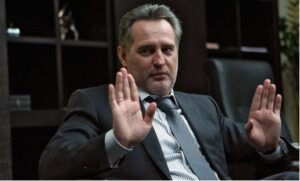
Dmytro Firtash
Since the beginning of 2023, troubling processes for businesses have continued and expanded
News about searches and criminal cases against well-known businessmen have become frequent, with many left bewildered by the claims made against them.
Oleksandr Kosovan, the founder of the IT company MacPaw, whose programs are installed on one out of every five Mac computers, invested over 25 million euros in a recreation centre for his company’s employees and faced searches due to unauthorised shoreline expansion on the plot where the wellness complex is being built.
The Bureau of Economic Security (BES), an agency created as a result of reforms to replace the tax police, initiated a case against the company “M-Kino,” which owns the “Multiplex” cinema chain, for tax evasion.
A sudden raid by the SSU and National Police on the office of the developer ImproveIT Solutions almost disrupted the company’s project for an important U.S. client. Investigators came under the pretext of a case involving the “creation and distribution of pornography,” seizing five laptops. Six days later, the equipment was returned without any explanation.
These are just a few examples of the large number of incidents that occurred with Ukrainian business at the end of 2022 – beginning of 2023. The two most high-profile events in the spring of 2023 concerned the activation of very old criminal cases to achieve dubious goals.
In April last year, the Pechersk Court of Kyiv seized the corporate rights of the gas production company “Ukrnaftoburinnya” as material evidence in a case that was initiated almost 10 years ago. Five days later, these rights were transferred to the management of ARMA, effectively taking the company away from its owners and forcibly nationalising it.
Another criminal case, also initiated 10 years ago around land privatisation, led to searches at the home of Igor Mazepa, the founder of the investment company Concorde Capital, who is popular among business circles and journalists. Mazepa called on the business community to organise self-protection against the arbitrariness of officials and judges. He was supported by other entrepreneurs, leading to the creation of “Manifesto 42.”
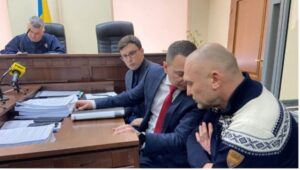
Ihor Mazepa in Pechersk Court of Kyiv
Mazepa’s initiative and that of his like-minded supporters led to a public discussion of the situation. Articles appeared in the press, where journalists sought answers to why the number of business complaints about repression had increased several times.
One of the most in-depth investigations was published in May 2023 in the Ukrainian Forbes under the eloquent title “Taxes, the ubiquitous Tatarov, the Russian trace. Businessmen complain that security forces are increasing pressure. There are at least five reasons for this and only one piece of advice.”
The article is the first to formulate an explanation and to name an official who is considered the “general producer” of pressure on business.
“Four interlocutors from the financial, economic and anti-corruption committees of the Verkhovna Rada, as well as the OP (Office of the President), believe that the pressure on business is directly or indirectly related to the fact that almost all law enforcement agencies came under the influence of the President’s Office, namely the deputy head of the OP, Oleh Tatarov.

Oleh Tatarov, Deputy Head of the Office of the President of Ukraine
“Since the times of the Revolution of Dignity, there has been no instance where all law enforcement agencies were under the control of one person,” says one interlocutor in the Verkhovna Rada, asking not to be named in this article.
“It is difficult to oppose such a person.”
Another interlocutor notes that this situation has led to the destruction of the system of checks and balances, saying that “Previously, there was competition between law enforcement agencies, and they were afraid of each other.”
“A businessman could complain about the SSU to the police. Now there’s no one to complain to – they’re all in the same harness.”
The publication garnered huge resonance and led to a meeting between business representatives and the President in June 2023
The business community hoped for the dismissal of Tatarov or at least his removal from positions of influence.
However, instead, in July 2023, Tatarov began participating in a coordination platform for resolving problematic issues between business and law enforcement agencies, signalling the retention of his dominant role.
On January 19, 2024, the initiator of the “Manifesto 42” movement, Mazepa, was arrested without a court decision on his way to the Davos Forum.
The arrest was carried out by employees of the State Bureau of Investigation (SBI) and the National Police – law enforcement agencies over which Tatarov has significant influence.
Why are Ukrainian businesses afraid of Tatarov?
Deputy head of the Office of the President (OP) Oleh Tatarov is disliked by business, anti-corruption activists and the press, since he personifies the corrupt pro-Russian government that Ukrainians got rid of during the Revolution of Dignity in 2014.
The democratic uprising in Ukraine was an anti-Russian, pro-European action triggered by the refusal of the authorities, led by the leader of the Party of Regions, President Viktor Yanukovych, to sign an Association Agreement with the EU. Russia was against this agreement.
At the end of November 2013, the police beat protesting students. This sparked a nationwide uprising, resulting in Yanukovych fleeing to Russia and the election victory of pro-European politicians in Ukraine.
From 2011 to 2014, Tatarov was the deputy head of the investigative department of the Ministry of Internal Affairs and publicly justified the actions of the authorities and police. Later, as a lawyer, he defended police officers involved in the shootings of demonstrators.
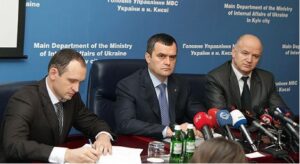
Tatarov (left) and the head of the Ministry of Internal Affairs during the Yanukovych era, Vitaliy Zakharchenko (center) in December 2013
He established his network of agents even before actor Volodymyr Zelensky won the presidential elections in 2019. Journalists found information about 59 people who defended their scientific dissertations with Tatarov’s participation between 2014 and 2020, when he was not yet working for the government. Among them were judges, police officers, and prosecutors considered loyal to him.
Tatarov’s personality was a discordant element with the programmatic theses of the new president, who shortly after his election signed a law on business protection, promised to bring Ukraine into the TOP-10 of the World Bank’s ease of doing business ranking within 3-4 years, and declared that “the State is a service agency creating conditions for business.”
Presumably, in 2020, the young, inexperienced, and romantically inclined government team needed a communicator with the old part of the official law enforcement and judicial system from which they could not quickly get rid of. The choice fell on Tatarov. Subsequently he used the transformation of power caused by Russia’s invasion to strengthen his positions.
Recently, Reuters published a major article on how, after his election, Zelensky tried to introduce the most liberal order in Ukraine, and now he is a president under the constraints of democracy caused by martial law.
Most of Forbes’ interlocutors, close to the Presidential Office and the economic wing of the government, confirm that Zelensky, deeply engaged in diplomacy and the situation on the front line, has no time and energy for the economy and business problems.
Tatarov demonstrated his growing influence two months after the war began
In April 2022, the criminal case initiated against him in 2020 by the National Anti-Corruption Bureau of Ukraine (NABU), an independent body created after the Revolution of Dignity, was closed.
NABU only managed to arrest Artem Shylo, who until recently headed the SSU department for investigating cases against businesses. Anti-corruption activists call him Tatarov’s main trusted person and the curator of ARMA, where nationalised assets are transferred for management.
It is also worth mentioning the conflict between Tatarov and NABU. The successful work of this anti-corruption body is one of the most important requirements of Ukraine’s Western partners. However, as Tatarov has stated, “NABU is not a Ukrainian story.”
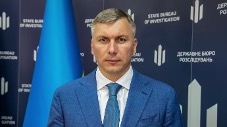
Oleksii Sukhachov, Director of the State Bureau of Investigation (SBI)
Tatarov’s orbit includes the head of the SBI (State Bureau of Investigation of Ukraine), Oleksiy Sukhachov. Their connection is so close and specific that it extends beyond official matters – Sukhachov, along with Tatarov and four other members of the selection committee for the head of the SBI, even co-authored and reviewed books.
It is possible that Tatarov also had a hand in the career of the current head of the SSU, Vasyl Maliuk. After Maliuk was dismissed from his position as the first deputy head of the SBU and head of the anti-corruption department in 2021, Tatarov facilitated his appointment as deputy minister of internal affairs.
Another ally of Tatarov is Rostyslav Shurma, the deputy head of the OP overseeing the economic bloc. These two are the only former members of Yanukovych’s notorious Party of Regions among all the employees of the Presidential Office.
The relationship between Tatarov and Shurma was recently solidified by a court decision. In March 2024, Judge Svitlana Shaputko of the Pechersk Court, who defended her dissertation with Tatarov’s help in 2018, dismissed the case against Shurma for violating conflict of interest prevention requirements, as accused by the National Agency on Corruption Prevention.
They appeared together at the business meeting in July 2023, crushing the hopes of “Manifesto 42” participants to convey the need for personnel changes to the President.
Their relationship is potentially very dangerous for business.
Tatarov has the leverage to organise the illegal seizure of private property through the courts and apply pressure from the security services. Shurma coordinates the appointment of state-controlled managers to positions managing confiscated assets.
Shurma’s desire to see his protégé lead the largest oil production and refining holding, consisting of “Ukrnafta” and “Ukrtatnafta,” may have led to the dramatic consequences for shareholders unjustifiably deprived of property rights and, more importantly, to damage to the state’s interests.
Click on the diagram below to have the full picture in a big window

Tatarov’s network
The story of “Ukrnafta” and “Ukrnaftoburinnya” has become a symbol of lawlessness
During the Davos Forum-2023, Shurma provided an explanation for why the authorities seized shares from private owners of “Ukrnafta,” including non-residents, in November 2022.
According to him, it was due to the company’s management refusing to supply petroleum products to the Ukrainian army.
At the same time, the former chairman of the board of “Ukrnafta,” Oleh Hez, called this information unreliable.
“Ukrnafta” is an oil production company; it does not produce petroleum products but only sells the extracted oil.
“Ukrnafta” has never had obligations to supply fuel for the needs of the Armed Forces of Ukraine. Despite the lack of obligations, since the Russian invasion, the then-management of “Ukrnafta” systematically provided assistance to military units and territorial defence units, refuelling military equipment at “Ukrnafta” gas stations for free.
The former head of the supervisory board of “Ukrnafta,” Mykola Havrylenko, was frankly surprised by this interpretation.
“All I can say is that I am unaware of any unmet obligations for the supply of petroleum products by ‘Ukrnafta.’ If such issues ever arose, they would have been brought up in meetings, and if not – I have no other information. What volumes are being discussed, and at what times… This is news to me,” he commented on the issue for the media.
The term “nationalisation” used by Shurma in the context of “Ukrnafta” sounds incorrect, as until November 2022, the controlling stake (51%) was already owned by the Ukrainian state through NJSC “Naftogaz of Ukraine.”
Nothing prevented the state, as the main shareholder, from changing the company’s management or deciding to direct all revenues to support the Armed Forces of Ukraine.
Instead, under the slogans of the need to “punish” “Ukrnafta” for not supplying fuel to the army, the Law of Ukraine “On the Transfer, Forced Alienation, or Exclusion of Property under the Legal Regime of Martial or State of Emergency” was used, to allow the confiscation of property from citizens and enterprises during wartime until its end.
Subsequently, the assets must be returned to the owners, or if this is impossible, their market value must be compensated.
According to the provisions of this law, only property necessary for military needs can be confiscated. However, in this case, it was not petroleum products (which, as we recall, “Ukrnafta” did not produce) that were confiscated, but 49% of the shares of “Ukrnafta” minority shareholders, signed by the Commander-in-Chief of the Armed Forces of Ukraine.
The seizure of private foreign investors’ shares allegedly for military needs appears strange. At the same time, a new director, Serhiy Koretsky, was appointed, fully controlled and accountable to the Deputy Head of the Presidential Office, Shurma.
There were no complaints about the performance of the management of “Ukrnafta,” which was unjustifiably dismissed in November 2022. Former Deputy Minister of Finance of Ukraine, Olena Makieieva, stated in an interview, “The Supervisory Board exercised appropriate oversight of the board’s activities, the audit committee (under the Supervisory Board of ‘Ukrnafta’ – ed.) had no complaints about the work of the head of the company and board members.”
One of the authors of the Ukrainian corporate law reform aimed at converging with the best European practices, Serhiy Boytsun, declared in March 2023 that the new Supervisory Board of “Ukrnafta” was illegitimate since it was formed in violation of the law on joint-stock companies.
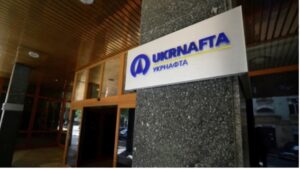
Foto- Ukrnafta’s Head Office
This also applies to the company’s appointed head, Koretsky, as he was appointed by an illegitimate Supervisory Board.
Boytsun’s remark about the quality of corporate governance in “Ukrnafta” after the so-called “nationalisation” is noteworthy: “There can be no talk of corporate governance standards since the Supervisory Board consists solely of representatives of the shareholder (Ministry of Defence) and acts solely as silent signatories.”
Quality corporate governance in strategically important companies is a mechanism that should balance interests in a civilised manner.
It is obvious that after November 2022, such a statement is impossible regarding “Ukrnafta.”
“You don’t need to be an insider to understand that there is now manual control,” Boytsun asserted. From the perspective of corporate law, in his opinion, the decision to seize “Ukrnafta” shares from minority shareholders is deeply flawed.
Under full state control, “Ukrnafta” became the subject of corruption and management scandals. Instead of providing free fuel to the Armed Forces of Ukraine (the basis for applying the “military law”), the new company management sued its curator, the Ministry of Defense, to expedite the receipt of more money.
In violation of Cabinet of Ministers Resolution No. 178 of 02.03.2022, according to which operations for the supply of petroleum products to the army, National Guard, and other security structures during the war are subject to a zero VAT rate, “Ukrnafta” included a 7% VAT rate in the contract, and then, after its change, 20%.
Through this manipulation, it received an additional 350 million UAH (7.8 million euros).
To force the Ministry of Defense to pay even more money, the company went to court. This outraged a member of the Ukrainian parliament, the first deputy head of the parliamentary energy committee, Oleksiy Kucherenko, who sent a parliamentary inquiry to the Prosecutor General of Ukraine.
The situation is even worse at the oil and gas company “Ukrnaftoburinnya” (UNB). This was the second-largest gas producer in Ukraine among private companies. Now it has stopped operating altogether, even though Ukraine urgently needs its own energy resources and budget revenues from taxes during the war.
In the spring of 2023, the company was taken away from private owners for no apparent reason and transferred under the control of Koretsky. The reason for the confiscation was a criminal case related to a licence to develop the Sakhalin field in the Kharkov region, where Russian troops are trying to break through.
Over the course of a few days in April 2023, the Pechersky Court of Kyiv issued three court decisions. The company’s shares, seized as evidence in a criminal case, were transferred to ARMA, which, in turn, transferred them to the management of Ukrnafta. This decision was made by judge Vita Bortnitskaya, who once defended her dissertation with the help of Tatarov.
To legalise the actions of transferring “Ukrnaftoburinnya” under the management of “Ukrnafta,” it was necessary to obtain a document from the Antimonopoly Committee of Ukraine (AMCU) stating that such a merger did not result in market monopolisation.
This document was obtained, but with apparent signs of procedural and legal violations. In the future, it could become the subject of a criminal or anti-corruption case.
However, even these attempts at falsification proved pointless. What was supposedly being avoided by transferring the company to state management still happened.
The problematic licence, which was the reason for seizing “Ukrnaftoburinnya” from its owners, was annulled by the court. The company halted production at Sakhalinsk, at a time when Ukraine critically lacks energy resources.
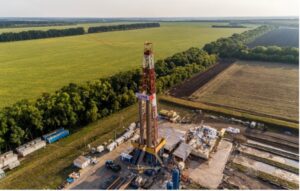
Foto – Oil production in Ukraine
Deputy Kucherenko asked the ARMA management why, many months after the licence was revoked on November 28, 2023, the gas production company’s work had not resumed.
He also asked Koretsky whether the state manager of Ukrnaftoburinni, Oleg Malchik, was present at the court hearing on November 28, 2023. He further questioned the fact that instead of attending the court hearing about the fate of his company, Malchik went abroad, despite the fact that Ukrainian men aged 18 to 60 are prohibited from freely leaving the country during the war.
The main mystery is why ARMA, together with “Ukrnafta,” from August to November 2023, before the court’s decision to revoke the licence, did not appeal to the Cabinet of Ministers and the state geological service to withdraw the state regulator’s lawsuit?
Perhaps the true goal of the nationalisation of “Ukrnaftoburinnya” was not to save the enterprise but to destroy it, so that some company close to officials could profit from the field’s development?
The climax of absurdity from the perspective of state interests is the seizure of regional gas distribution companies from businessman Firtash into state ownership.
The payment level for gas by the population in Ukraine was already quite low before the full-scale war.
Following the sharp decline in income after the full-scale invasion, it fell to an extremely low level. Under the private owner (Firtash), the losses were borne by him, but after nationalisation, they became an additional burden on the state budget of Ukraine, which had a deficit of 18.6% of GDP in 2022 and 20.6% of GDP in 2023.
The budget deficit for 2024 is planned at 1.57 trillion UAH, but on July 15, the head of the parliamentary budget committee, Roksolana Pidlasa, announced that th budget still lacked 0.4-0.5 trillion UAH this year. At this time, the unpaid gas bills of impoverished Ukrainians are being covered by the state budget instead of billionaire Firtash.
It is likely that the initiators of the seizure of his gas distribution companies were guided by personal enrichment – schemes for gas misappropriation and theft are popular – rather than by state interests.
Will Ukraine be able to raise billions for its reconstruction if it cannot guarantee property rights to investors?
The July statement by the participants of “Manifesto 42” exudes pessimism. Nearly 2.5 years after Russia’s attack on Ukraine, Ukrainian businesses do not complain about the hardships of war and the severe destruction of the energy system that complicates their work.
They ask the authorities not to violate their constitutional rights to business and not to seize their property under the pretext of wartime needs.
Ukraine is desperately and heroically resisting Russian aggression. Each Russian missile strike leads to severe destruction and casualties in various cities across the country.
The destruction of the central children’s hospital in the capital, Kyiv, where Ukrainian children were being saved from cancer and other severe diseases, shocked the world. In a few hours, Ukrainian businesses raised tens of millions of euros to rebuild the clinic.
Not a single businessman who legally works in Ukraine, who financially and technically supports the army in countering Russian aggression, and who complains about the inconveniences associated with logistics issues, the partial occupation of Ukrainian territories and the mobilisation of the male population, can be completely sure that he will not face unfounded claims from corrupt judicial and law enforcement agencies and will not lose its business based on unfounded future accusations.
Tatarov Remains a Very Intimidating Figure
Investigative journalists and anti-corruption activists who consistently criticise Tatarov and claim that his actions delay Ukraine’s accession to NATO and the EU face criminal charges.
This threat extends even to those who have mobilised into the ranks of the Armed Forces of Ukraine (AFU), as was stated by Daria Kaleniuk, Executive Director of the Anti-Corruption Action Centre, in the corridors of the discussion “A Decade of Transformation: Rule of Law and Anti-Corruption in Ukraine with EU Support.”
She referred specifically to the well-known activist Vitaliy Shabunin.
According to estimates by the UN, World Bank, and European Commission, rebuilding Ukraine after the war’s destruction will require 480 billion euros over the next 10 years.
At the “Reconstruction of Ukraine 2024” conference in Berlin in June 2024, Ukrainian authorities presented numerous projects vying for private investments from foreign investors. However, the risks of investment and property loss were not addressed.
The business world remains observant and cautious
Co-owner of the IT company Genesis, Volodymyr Mnogoletniy, stated in an interview with Forbes that in the two years of war, he had not seen a single major foreign investor willing to invest in Ukraine.
The primary investors and job creators in the country are Ukrainian enterprises, which are being oppressed by high-ranking officials.
Currently, insurance is only available against losses caused by the war. However, there is no insurance against property seizures by officials who were members of Yanukovych’s pro-Russian party, and now, during the war, have received unlimited power by occupying key leadership positions in the Office of Zelensky, a president who probably doesn’t even suspect the critical character of the situation that his inner circle has created.
(*) Alexander Stern
Analyst and journalist, born in 1973. He graduated from Riga Technical University in 1995. Until 2016, he worked as an analyst at ABLV Bank, one of the largest private banks in the Baltic States, headquartered in Riga (Latvia) with representative offices abroad from 1993 to 2018. Afterwards, he worked in France as a freelance investigation journalist. Consultant on business mergers and acquisitions.
Sources click HERE.







